Succeeding with omnichannel SEO for customer journey
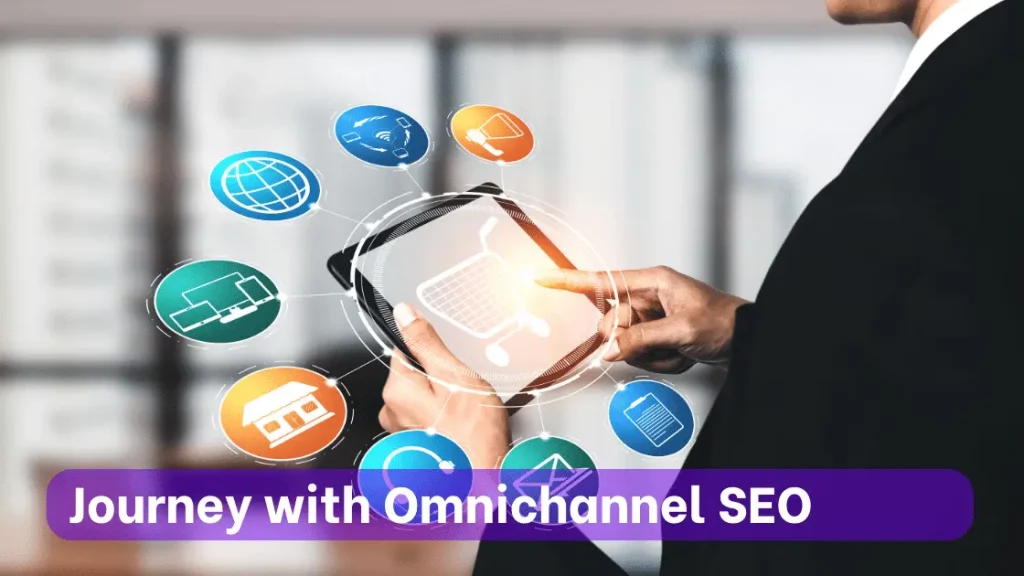
Digital marketing is rapidly changing and therefore not only problematic, but the customer moves with ease.
With the smooth coordination of activities from a variety of perspectives, omnichannel SEO goes beyond standard limitations and is essentially an integral approach to enhancing your online visibility.
It states that potential customers freely move from one website, social media platform, search engine, or any other digital channel.
As a result, omnichannel SEO ensures that your brand message, content, and exposure are strong therefore impactful to the anticipated audience ensuring them an interactive coherent experience.
Have you heard about the term “Omnichannel SEO” yet? This is a simple visual symbol for easy understanding.
Think of your brand as a vibrant constellation in the vast universe’s galaxy. Each online contact is a separate luminous star that helps your brand to shine even brighter.
With the idea of Omnichannel SEO being similar to a cosmic force responsible for weaving an enchanting mural from stars, consider it now.
It is the gravity that pulls all your stars—social media, search engines, and whatnot into a dynamic constellation of influence creating a stunning celestial display across space infinite.
Get ready to journey beyond the stars, where every touchpoint is a glowing star and omnichannel SEO drives their cosmic ballet.
Read the other important SEO terms from the complete list of SEO cheat sheet.
Table of Contents
Part 1: What is Omnichannel SEO?
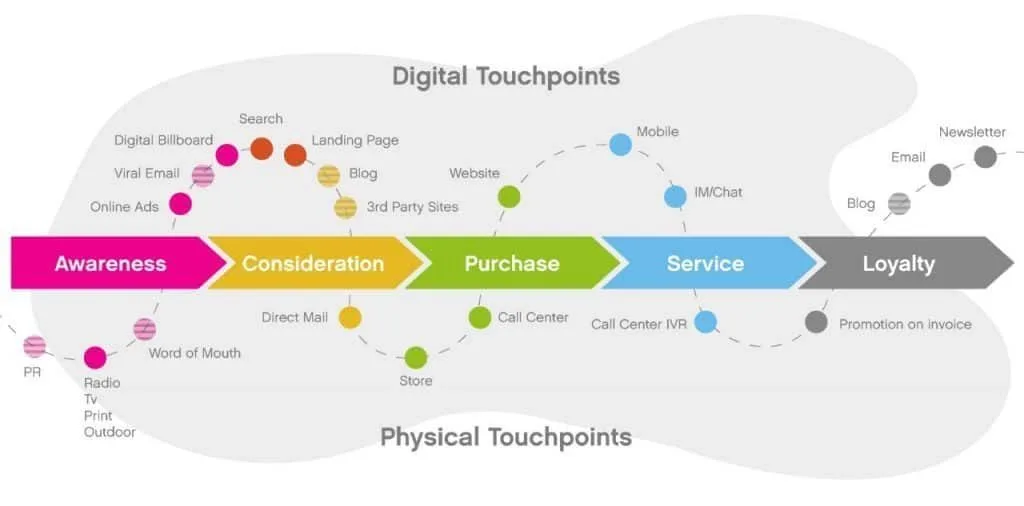
Source: https://blog.salespanel.io/
Omnichannel SEO is a multidimensional strategy for integrating the use of Search Engine Optimization (SEO) tactics across all types of online platforms to improve and hone customer perception.
This total approach recognizes that the consumer engages brands in multiple digital contact points, from search engines to social networks and websites, etc.
The desired outcome of omnichannel SEO is to align the brand’s message, visibility, and user experience between people on different platforms such as websites and mobile devices.
Through coordinating SEO activities on various platforms, the brand presence becomes firmer and increases positive engagement between brands with their users at points of contact.
Benefits of Omnichannel SEO
Consistent brand experience:
- The term omnichannel SEO refers to a consistent brand experience across all online channels.
- This integration drives brand recognition and trust, as users interact with a consistent message in terms of design or language regardless of the social landscape they navigate through.
Enhanced visibility:
- Omnichannel SEO strives to achieve desired visibility by creating optimal content and strategies across multiple channels.
- This increases the audience for your brand, increasing its visibility and likelihood that potential customers will find it, interact with its content, or buy products from this.
Improved user experience:
- The successful merger of SEO strategies leads to changes in the user experience.
- With seamless transitions between the varying online touchpoints, visitors can obtain information that is valuable and relevant everywhere they find it while their satisfaction level increases along with a growing engagement.
Adaptability to consumer behavior:
- Omnichannel SEO reflects how consumers search through the virtual world.
- Businesses need to increase their search flexibility by adapting from different platforms across the Internet and social media, which in turn helps them relate to just what customers prefer for them.
Optimized conversion paths:
- The full-cycle approach to SEO includes optimization not only for visibility but also for conversion.
- Omnichannel SEO determines and perfects conversion routes across multiple channels, leading users down a single smoothened path from discovery to transformation.
Data synergy:
- Integrated SEO provides for the collation and analysis of vast amounts of data from multiple channels.
- It is only this holistic vision that allows businesses to acquire meaningful insights, adapt their strategies, and make data-driven decisions to contribute thorough marketing success.
Competitive edge:
- Omnichannel SEO makes one’s brand present on all digital platforms and provides an opportunity to compete fiercely with the competition.
- Effective coordination of brands’ online presence causes those target groups to pay more attention and retain them for long periods.
Brand resilience:
- Omnichannel SEO plays a role in brand resiliency because it allows you to increase the breadth of your reach and methods for engaging while stimulating awareness.
- This guarantees that alterations in algorithms, platform policies, or market trends are less likely to inflict disruptive effects due to your brand’s proper distribution across different channels.
Increased customer loyalty:
- Regret, dissatisfaction, and apathy on the customer journey create loyalty.
- Omnichannel SEO ensures that the identification, actions, and interaction with customers are encapsulated through an existing loyal customer base brought about by providing a coherent seamless experience adapted for reliable expectations.
Measurable ROI:
- Since omnichannel SEO enables better measurement of ROI for your marketing initiatives, By using a consolidated analytics approach, the businesses can better monitor and attribute results thus enabling these companies to harness their strategies for maximum performance.
Part 2: Omnichannel SEO for different online industries
Omnichannel SEO is one of the most effective strategies that can be applied in different industries to improve their representation and consumer experience on the Internet.
E-Commerce

By using omnichannel SEO in e-commerce, it is possible to develop a comprehensive strategy that will optimize the online profile of e-commerce businesses across different channels.
It understands that the consumers have many points of interaction with this brand, and a unified and cohesive strategy is critical for success.
How Omnichannel SEO supports the E-commerce industry?
Unified product visibility:
- Omnichannel SEO guarantees that product listings from all applicable channels are always optimized appropriately. This covers your online shop, internet search results, social media platforms, and third-party marketplaces.
- Keywords, product descriptions, and images are meticulously organized to ensure a consistent flow that is thoroughly engaging.
Seamless shopping experience:
- The strategy goes beyond individual channels to deliver a consistent shopping journey to customers. Product search to final purchase should provide a seamless journey.
- Optimization efforts aim to achieve an integrated brand message across all platforms, price information, and product availability.
Local SEO for physical stores
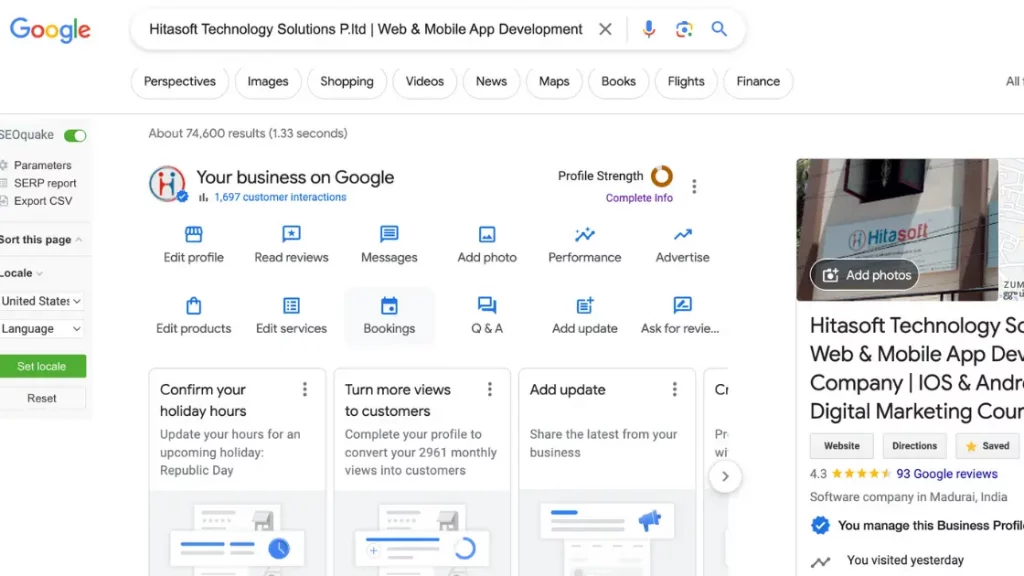
- However, for ecommerce companies running stores in a traditional brick-and-mortar setting that business is done by local SEO. Optimization for local searches makes sure that customers searching for products in the vicinity are being directed both to an online store and physical outlets.
- This type of information, such as stores’ opening hours and addresses alongside contact details is consistently improved across multiple channels.
Related article: What is local SEO 3-Pack?
Mobile optimization:
- Given the increased use of mobile shopping, Omnichannel SEO in e-commerce focuses on optimizing for mobiles. Mobile-compatible websites and product listings are optimized; hence users have no problem accessing well when using their smartphones or tablets.
Social media integration:
- Integration of e-commerce marketing with social media is an important element. Omnichannel SEO helps integrate social media content, product promotion strategies, and engagement to be integrated into a single strategy.
- Hashtags, keywords, and links to products are deliberately aligned in various social media channels for an optimum perception.
User reviews and testimonials:
- The management and manipulation of user reviews as well as testimonials are necessary for establishing trust. Favorable reviews result in a favorable online reputation that shapes the decision-making of prospective consumers.
- Review responses and the general sentiment are considered integral parts of the holistic SEO strategy.
Cross-Platform marketing campaigns:
- E-commerce companies conduct cross-platform marketing activities. Omnichannel SEO ensures that the corresponding campaigns are congruent and conveyed thoroughly using different communication channels.
- The keywords, messaging, and visuals also support the development of a single brand image and message.
Local businesses
Concerning the local community, Omnichannel SEO makes businesses visible and engaging via multiple online platforms like websites, mobile applications, etc. The approach corresponds with the local audience’s specific requirements and improves customer service.
What are the strategies to implement Omnichannel SEO in local businesses?
Local keyword optimization:
- Target the local keywords that customers may have as they look for stock.
- localized terms in meta tags, headings, and content to improve ranking within search engine’s results for a location area.
Google My Business (GMB) optimization:
- Name, address, phone number (NAP), business hours, and categories should be accurately claimed and optimized for Google My Business listing.
- Motivate and reply to customer reviews on your GMB profile to boost its local credibility.
Localized content marketing:
- To produce content that is related to the local community. This can involve blog entries, articles, or social media posts about the local environment’s happenings in terms of emerging news items and trends.
- Place location-based keywords organically in the content to attract local search demand.
Local citations and directories:
- Make sure that your business data is in line with other online sources and citation sites. This continuity only strengthens the local indicators of search and contributes to improving local SEO.
- Create your business listings on accounting sites like Yelp, Yellow Pages, etc.
Mobile optimization for local searches:
- As most local searches are performed on a mobile device, optimize your website for use by those devices. Make your website responsive to make sure that people are not struggling when accessing it from mobile devices.
- Add local schema markup to create an extra layer of understanding for search engines about what kind of business you are running.
Local Social Media Engagement:
- Set up a meaningful connection with the local community through social media. Post content that is associated with local events (festivals, holiday sales), and promotions of products and services which they market to the community.
- Use location hashtags and geotagging to reach the users interested in or with comments on what is going around locally.
Local link building:
- Establish local backlinks through business collaborations, attend local events and initiatives; and support the regional products.
- Try to get featured on relevant local news sites or community blogs to make high-quality links back.
Local Pay-Per-Click (PPC) advertising:
- In using PPC, try to use geotargeting to target regional audiences. Focus your advertising copy on the location and target the local audience’s needs.
- Make the most of location extensions on your PPC ads to provide more details concerning the closeness of business concerning the user’s whereabouts.
SaaS providers
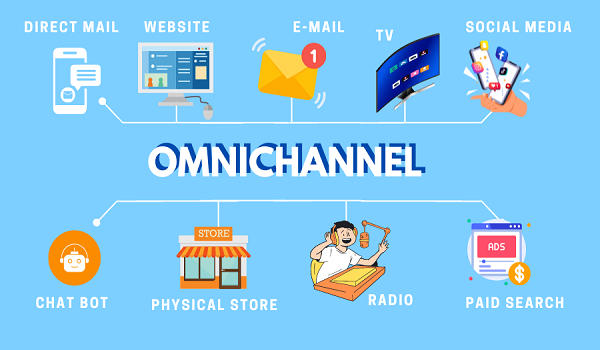
Source: https://www.enlybee.com/
For SaaS providers omnichannel SEO is focused on developing a unified and compelling online identity, making the solution visible in relevant channels as an effectively reputable product, taking into consideration the audience profile having access to be implemented.
It is an approach that comprises a tactical and coordinated initiative to enhance the online presence across multiple channels.
Tips to utilize omnichannel SEO for SaaS providers
Unified messaging across channels:
Keep the brand message consistent and cohesive between all areas of the website, blogging, social media, and every other form of communication. It adds to the overall coherence of messaging and thus contributes to brand identity.
Content optimization for user journey:
Optimize the content to meet different stages of the customer journey. This encompasses the development of educational material for awareness, rich product information to guide choice, and tutorials or case studies that promote purchase.
Keyword strategy across platforms:
Create a comprehensive keyword strategy that covers search engines, social media, and other platforms. This blog post will help you understand how to choose the right SaaS keywords for your website.
Technical SEO for SaaS websites:
Practice sound technical SEO to make sure that the SaaS created is easily crawlable by search engines. This also covers strategies for optimizing page speed, mobile responsiveness, and site architecture maintenance.
Social media integration:
Combine SEO techniques with social media plans. If you target the same content to different platforms, interact with your audience, and use social networks to spread SaaS-related information.
Utilize social networks such as LinkedIn, and Twitter and appropriate discussion boards shared by SaaS experts or potential customers.
Localized SEO for global reach:
If necessary, use a geolocalized SEO approach to target the local audience.
The localization process involves such measures as creating the translated content, incorporating keywords that are used in your region, and adopting marketing campaigns to reflect a consumer’s preferences.
User reviews and testimonials:
Maximize user feedback on such sites as G2 Crowd, Capterra, and TrustRadius. Although positive ratings build credibility for a brand, responding to feedback allows one to demonstrate responsiveness.
Educational and thought leadership content:
Develop and fine-tune content that trains the SaaS provider to be an industry thought leader. Education can take the form of blog posts, whitepapers, webinars, and so on.
Optimize content for relevant keywords and popular queries about the industry to attract organic search.
Email marketing integration:
Blend SEO techniques in email marketing. Ideal subject lines for an SEO-friendly approach are concise text containing keywords and phrases that link back to the relevant web pages or blog posts.
Make sure that email messages follow bigger campaigns like SEO or content marketing strategies.
Part 3: Building your Omnichannel SEO team
The formulation of a solid Omnichannel SEO team management requires finding individuals that together can navigate through the complicated digital environment together.
Creating a diverse team of experts, skills of digital marketing and SEO from all sides are equally important.
How to set up an omnichannel SEO team?
- Determine the key roles and responsibilities: according to the individual needs and goals of your company, determine the critical functions that your omnichannel SEO team will have to do. Project managers, social media managers, data analysts, SEO experts, and content creators are usual positions.
- Employ Skilled Personnel: Reach out to specialists spanning a wide range of knowledge and competence in the field of search engine optimization and digital marketing. Look for candidates with technical SEO, social media management, content optimization, keyword research and analytics experience.
- Promote Collaboration: Aim to build an environment in the workplace which will allow team members to easily collaborate on different platforms. For effective agreement and coordination, encourage open communication and collaboration.
- Provide Ongoing Training and Development: Develop an investment in training and development programs to provide team members with knowledge about the latest in digital marketing and SEO trends, tools and strategies. Give opportunities for development and make learning a lifetime experience.
- Set Specific Objectives and KPIs: With the goal of evaluating the efficiency of your complex multichannel SEO campaigns, define particular goals and key performance indicators (KPIs). Set achievable objectives and do regular follow-up to ensure that your staff are sticking to the goals.
- Adopt Agile Project Management Methodologies: Through agile project management techniques, teamwork becomes more effective and omnichannel SEO campaigns management is possible. For tracking progress and putting together a workflow, utilize tools such as the communication platforms and project management software.
- Encourage Cross-Functional Collaboration: Foster cross-functional collaboration within different teams within your company; such as content, design, development, and marketing. Teams that collaborate well can utilize each other’s areas of skill to create a unified and holistic SEO strategy.
- Remain Adaptive and Agile: The continuous changing of the digital environment comes with a call for adaptability and agility. Foster creativity in your team, be agile, and adjust your plans accordingly to the new information and emerging patterns.
- Measure and Analyze Results: Track & measure your multichannel SEO campaigns using the data analytics tools on a regular basis. Decide on the weak spots in your strategy and locate the optimization areas. After that, use data-driven ideas to modify it.
List of SEO personnel involved in omnichannel SEO
Please see below personnel listings, with combined skills of diverse leadership strategies and commitment to learning so this can power your Omnichannel SEO in success.
SEO specialist:
Expertise: A good understanding of search engine algorithms, keyword research, on-page and off-page optimization as well as competent SEO tools.
Responsibilities: Head the SEO strategy in general, web content optimization, and keeping abreast of all industry news.
Content creators and copywriters:
Expertise: It requires that you maintain strong writing skills, be creative, and know the best SEO practices for content.
Responsibilities: Develop attractive content for different platforms such as websites, blogs, social networks, and email that follow SEO rules.
Technical SEO expert:
Expertise: Knowledge of website structure, HTML coding, crawling, and technical factors influencing SE rankings.
Responsibilities: Improving the technical aspects of a website, which means it is search engine-compatible and performs well.
Social media specialist:
Expertise: Skills in social media networks, content curation, and insight into the way algorithms work regarding these platforms.
Responsibilities: Social media strategies should be in line with the goals of SEO, content worth sharing, and encouraging engagement.
Data analyst:
Expertise: Facility with data analytics tools, reading performance metrics, and interpreting them into practical outcomes.
Responsibilities: Collecting and making analyses to evaluate the use of SEO strategies, discovering patterns in given data sets, etc.
Local SEO specialist:
Expertise: Knowledge of local search algorithms, Google My Business optimization, and local citation management.
Responsibilities: Local visibility approaches, local listing management, and location-based search optimization.
Link building specialist:
Expertise: Knowledge about link-building strategies, outreach methods used, and sources of links that are reliable.
Responsibilities: Acquiring quality backlinks to improve domain authority and make a bright SEO profile.
Project manager:
Expertise: This will make you work through leadership and organizational strength with knowledge of project management methodology.
Responsibilities: Overseeing the implementation of omnichannel SEO strategies, coordinating teamwork, and ensuring timely delivery.
UX/UI specialist:
Expertise: Knowledge of user experience and the principles underlying successful designs in an interface.
Responsibilities: Also, it involves ensuring a user-friendly website that improves engagement and conversion.
Mobile SEO expert:
Expertise: The principles of mobile optimization, mobile search algorithms, and responsive design.
Responsibilities: Enhancing the website and content with mobile users in mind, thereby ensuring ease of navigation on numerous devices.
Conversion Rate Optimization (CRO) specialist:
Expertise: Knowledge of CRO principles, A/B testing, and user behavior analytics.
Responsibilities: Conversion rate optimization of website elements, while taking into account the business strategies as a whole.
Key strategies for teamwork and communication
- One of the most important recommendations is to organize team meetings regularly to foster open debates and share data between specialties.
- Organize interdisciplinary training sessions or workshops to promote understanding of the other person’s duties, and tasks.
- Conduct follow-up sessions and on ones so that different matters can be discussed, such as clarifying concerns or strengthening relationships at work.
- Collaboratively set goals for the team to align all members in terms of ensuring collective responsibility and accountability over grand objectives.
- Initiate cross-functional projects to boost teamwork, allocating functions according to their distinctiveness for the accomplishment of the same goal.
- Harness communication channels such as Slack and Microsoft Teams for instant interaction, and establish exclusive project-related chat paths.
- Cultivate a requisite culture of feedback and idea exchange where employees can submit thoughts, ideas, as well constructive opinions.
- Arrange organized team-building sessions to move beyond the domain of mere work talk and present a friendly image among all employees.
- Make an open-door policy so that the team members are free to come and ask questions, suggestions, or any other concerns.
- Team successes can be appreciated when all members celebrate them together, such as reaching milestones or hitting targets, and successful campaigns.
Part 4: Tracking performance across channels
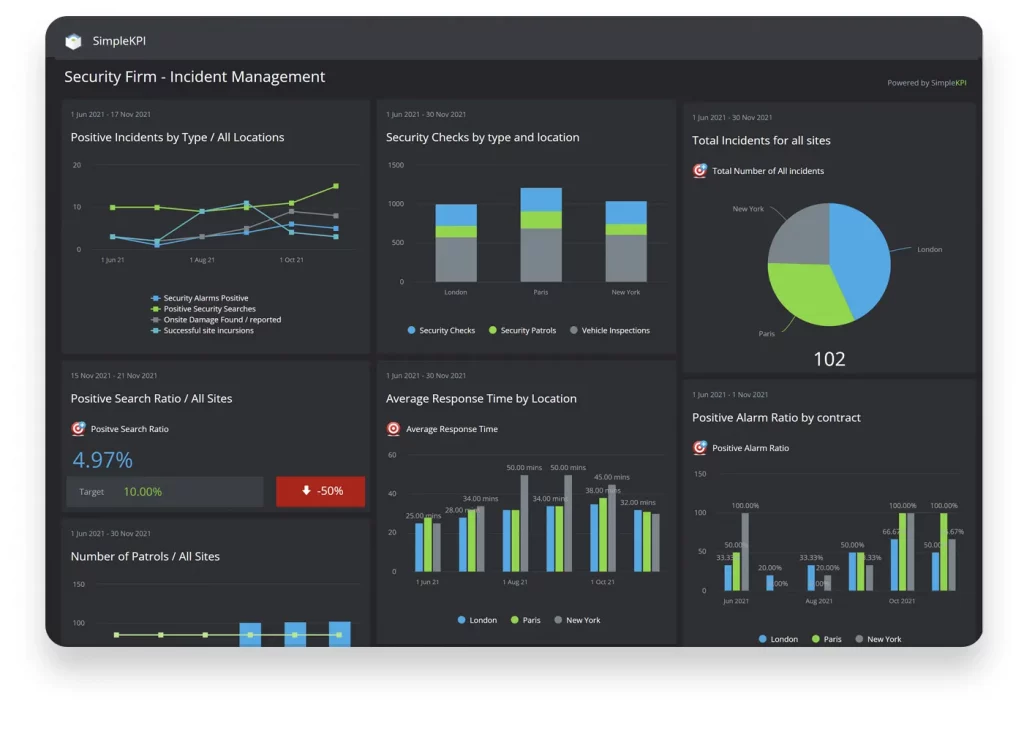
Source: https://www.simplekpi.com
Key Performance Indicators (KPIs) are often essential in evaluating the performance of multiple channels as part and parcel of Omnichannel SEO.
Organic traffic (SEO):
- Organic Traffic Growth: The rate of organic traffic growth to a website over the period.
- Keyword Rankings: Search engine ranking for keywords.
- Click-Through Rate (CTR): The click-through rate (CTR) compares the number of users who clicked on a search result to those who viewed it.
Social media engagement:
- Engagement Rate: The number of your audience who interact with the social media content you post (likes, shares, comments).
- Follower Growth: The social media followers count.
- Social Media Referral Traffic: The magnitude of ‘social’ traffic going to the website.
Conversion rates:
- Conversion Rate: The conversion rate of website visitors, which is the amount of those who take a desired action (such as submitting a form or completing their purchases).
- Landing Page Conversion Rate: The conversion rate of visitors to that landing page which means the percentage of visitors acting.
- Abandonment Rate: The rate of customers who begin the conversion paths but do not finish them.
Customer lifetime value (CLV):
- Customer Lifetime Value: The forecast net profit created during the entire customer’s lifetime.
- Average Revenue Per User (ARPU): The mean revenue generated per user over the specified time.
Email marketing:
- Email Open Rate: The open rates in the recipient’s mailbox for marketing e-mail.
- Click-Through Rate (Email CTR): Click-through response rate, or the proportion of email recipients who clicked on at least one hyperlink included in an e-mail.
- Conversion Rate from Email Campaigns: The conversion rate of the campaign, or, in other words, what percentage of email recipients completed an intended action (e.g., purchasing).
Paid advertising (PPC):
- Return on Ad Spend (ROAS): Return per dollar spent on advertising.
- Click-Through Rate (CTR) for Ads: The click-through ratio is a measurement that reflects users’ percentage who clicked an ad out of total numbered viewers.
- Cost Per Conversion: The cost per action is paid advertising
Mobile optimization:
- Mobile Traffic Share: The proportion of internet traffic that originates from mobile devices.
- Mobile Conversion Rate: The conversion rate of mobile traffic.
By monitoring these KPIs, companies can acquire meaningful information regarding channel performance and act based on data to improve their Omnichannel search engine optimization strategy productively.
Some tools that address different facets of performance measurement that are suggested are as follows:
Google Analytics: It is a web analytics app with full-feature insight into website traffic, user patterns, and conversion statistics.
Key Features:
- Traffic sources analysis.
- User demographics and behavior.
- Conversion tracking.
- Customizable reporting.
Google Search Console: Supplies details and overview of your site’s visibility in Google Search with results.
Key Features:
- Keyword performance.
- Indexing status.
- Click-through rates.
- Website errors and issues.
SEMrush: The one-stop SEO tool enables specialized keyword research, competitor analysis, and website quality assessment.
Key Features:
- Keyword tracking.
- Competitor analysis.
- Backlink analysis.
Ahrefs: SEO toolkit for backlink analysis, keyword research, and competitor monitoring.
Key Features:
- Backlink analysis and monitoring.
- Competitor research.
Moz: SEO software suite offering tools for constructing links, key works, and website checks.
Key Features:
- Domain and page authority.
- Keyword research and tracking.
AdWords (Google Ads): Google’s analytics platform that features tools for developing and auditing paid campaign advertising.
Key Features:
- Ad performance metrics.
- Keyword-level insights.
- Conversion tracking.
Part 5: My insights on navigating Omnichannel SEO
To ensure success in Omnichannel SEO one needs a holistic approach to optimize your online presence through different channels.
Unified brand messaging:
To ensure consistent branding messages across all communication channels. It may be a website, social media account, or an email campaign but having unity of brand voice increases recognition and trust levels with the audience.
Audience-centric content:
Alter your content to satisfy the interests and demands of your target audience. Know the unique needs of each channel, and craft content that can keep users hooked.
Cross-channel keyword strategy:
Drive a pan-device keyword strategy. Customize your keywords according to the user intent on each channel so that you can achieve optimal platform visibility with adequate delivery of relevant content.
Mobile optimization:
With the ubiquity of mobile, emphasis on all channels moving to a mobile-first approach. Make sure that your website, email, and social media posts give a consistent experience to the user from one device to another.
Data integration and analysis:
Combine information from various channels to get a broader perspective on user behavior and campaign efficacy Interpret this information to determine trends, maximize strategies, and plan usage of resources appropriately.
Social media integration:
Although your social media efforts may stand alone, they must be tightly interlinked with the SEO strategy. Social channels should be used for more than content distribution, but also to engage and build authority with their brands.
Local SEO focus:
Include local SEO strategies, especially if your business has physical locations. Optimize for local searches, control Google My Business listings, and keep coherence everywhere.
Responsive customer support:
Offer customer support that is well-responsive through all means. If users decide to contact you through social media, email, or your website it is important that these responses are consistent and promptly so as the streamline custom experience.
Conclusion
This is the time you should act and begin to develop Omnichannel SEO plans for your clientele. Use the power of an approach that tabulates organic search, social media, and email advertising among other parts.
And beyond being known, the advantages permeate brand credibility, customer involvement, as well as eventual business progression.
While you may be ready to take your digital strategy up a notch and require assistance in Omnichannel SEO implementation, our agency is at hand. To handle omnichannel SEO efficient try our SEO project management software now.
As such, contact us today to work together on a bespoke approach that reflects your business targets and ensures a consistent and effective digital presence across all platforms.
Let us commence the optimizing digital footprint for your brand.

